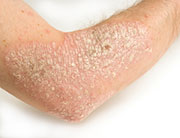In phase 3 trials, appeared to outperform standard medication, placebo
WEDNESDAY, June 17, 2015 (HealthDay News) — Ixekizumab, a humanized monoclonal antibody against the proinflammatory cytokine interleukin 17A, may offer a new and efficacious option for patients with moderate-to-severe psoriasis, according to two phase 3 clinical trials reported online June 10 in The Lancet.
The two trials (UNCOVER-2 and UNCOVER-3) included patients with moderate-to-severe psoriasis (1,224 patients in UNCOVER-2 and 1,346 patients in UNCOVER-3). Patients were randomly assigned to subcutaneous placebo, etanercept (50 mg twice weekly), or one injection of 80 mg ixekizumab every two weeks, or every four weeks after a 160 mg starting dose.
After 12 weeks of treatment, the researchers found that the patients taking ixekizumab showed better results than those taking etanercept or the placebo. In combined studies, serious adverse events were reported in 1.9 percent of patients given ixekizumab every two weeks, 1.9 percent of patients given ixekizumab every four weeks, 1.9 percent of patients given placebo, and 1.9 percent of patients given etanercept; no deaths were noted.
“Both ixekizumab dose regimens had greater efficacy than placebo and etanercept over 12 weeks in two independent studies,” the authors conclude. “These studies show that selectively neutralizing interleukin 17A with a high affinity antibody potentially gives patients with psoriasis a new and effective biological therapy option.”
The trial was funded by Eli Lilly, the manufacturer of ixekizumab.
Copyright © 2015 HealthDay. All rights reserved.








